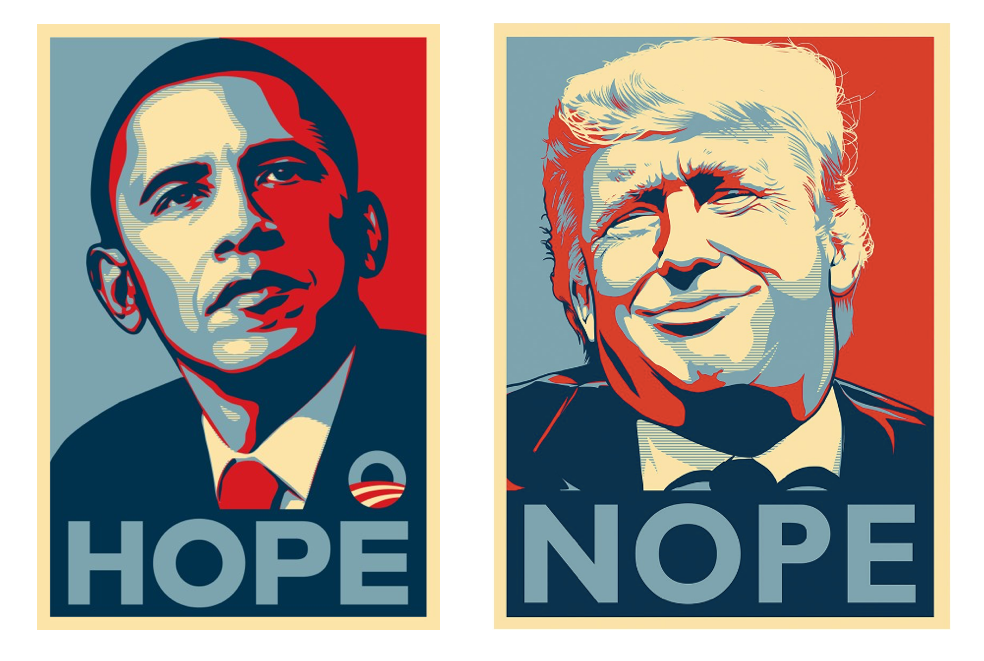Articulate Anger: Why Slogans Matter
2017 Washington Women’s March
I recently attended an exhibition reviewing the relationship between graphics and politics over the last ten years.
‘Hope to Nope’ (The Design Museum, London, until 12 August) considers various political and protest movements in the decade since Shepard Fairey’s famous 2008 ‘Hope’ poster in support of Barack Obama’s Presidential bid. It displays banners, posters and memes; stunts, symbols and slogans; from Occupy and Deepwater Horizon, to Taksim Square and Charlie Hebdo; from Brexit and the 2016 US election, to women’s marches and Black Lives Matter… and more besides.
We live in turbulent times.
You can’t help but be impressed by the lucidity, wit and invention of many of the pieces. You can see earnest Soviet posters subverted to include rainbow Pride colours; playful Jeremy Corbyn emojis; sinister Guy Fawkes masks; an ominous Trump fortune teller. In Hong Kong in 2014 protestors collectively adopted umbrellas, initially to shield themselves from the sun, and subsequently from tear gas. In Sao Paolo in 2015/16 marchers against tax rises and government corruption rallied to the theme of ‘I will not pay the duck.’ ‘Pay the duck’ means take the blame for something that is not your fault.
Often the material harnesses serious political messages to popular culture. After the Trump election victory, a Star Wars Rogue One poster became Rogue Won. And my former Agency BBH collaborated with the community action group Justice4Grenfell in a piece that referenced the movie ‘Three Billboards Outside Ebbing Missouri’: ‘71 Dead…And still no arrests…How come?’
The exhibition also offers a compelling selection of funny, smart and eloquent political slogans. Consider the following from various anti-Trump rallies:
‘Love trumps hate.’
‘Make love not walls.’
‘This pussy grabs back.’
‘I can’t believe I still have to protest this shit.’
‘A woman’s place is in the White House.’
‘Sexism is not sexy.’
And my personal favourite:
‘We shall overcomb.’
Of course, the language of protest has been familiar to us for many years. But in the digital age the impact of traditional approaches has been amplified by social media, memes and hashtags. Campaigns are easier than ever to initiate, endorse, adapt, share and spoof.
It’s therefore become more difficult than ever to cut through. Shepard Fairey expresses the challenge thus:
‘People have a lot of visual noise in their lives, so my work needs to be instant and memorable, easy to replicate and, even in an analogue world, potentially viral. Digital tools and social media mean that more people are empowered, but there are also white noise and mediocre graphics and memes bouncing around. I utilise the same principles that I always have when I transmit my work digitally: I want to be instantly memorable, evocative, and graphically and emotionally potent.’
As I wandered around the museum, I found myself wondering why the best rallying cries seem so compelling; why it is helpful to condense complex issues into catchy rhymes and phrases. Why do slogans matter?
Many years ago a girlfriend left me. I became depressed, inert, isolated. But more particularly I found I was completely inarticulate about how I felt. I couldn’t explain what had happened, why she’d gone, what I’d done to deserve this.
I took to going running round a local park. And as I ran I gradually pieced together in my head a narrative about what had gone wrong. I composed the speech I would deliver if I ever saw her again. And with every passing day and every exhausting circuit, the oration grew in clarity, brevity and articulacy.
Then, at last, my speech was perfect, crisp and concise. And I realised at that moment that I didn’t need to make it. I had moved on. I wouldn’t have to run round that muddy park again either.
‘The more acute the experience, the less articulate its expression.’
Harold Pinter
Some experiences are so intense, emotional, complex and confusing that we feel only unfocused anger, foggy regret, dim despair. We become powerless, helpless, listless.
It’s only when we can distil our feelings into words and phrases – when we can articulate our anger - that we can begin to recover and become capable of action.
Like any well-crafted copy, the best political slogans define how we feel about an issue; compress it into something clear, precise and strong; find fellow feeling with others; and motivate us to get out and do something about it.
But there are limits to what graphics and slogans can achieve. After an hour at the exhibition, having walked through an aggregation of witty words, angry sentiments and cool design, I began to worry that mass protest is becoming almost effortless in the social era. It’s just a little too easy to like and retweet; to post and hashtag; to endorse, sign up and send on.
In 2017 the artists’ street project flyingleaps published the following statement on UK poster sites:
‘Slogans in nice typefaces won’t save the human races.’
It’s a valid caveat: a political slogan is only as good as its power to prompt action. This is a sentiment that the Suffragettes had elegantly expressed over a century before:
‘Deeds not words.’
(This piece first appeared on BBH Labs on 23 April 2018.)
No. 180



